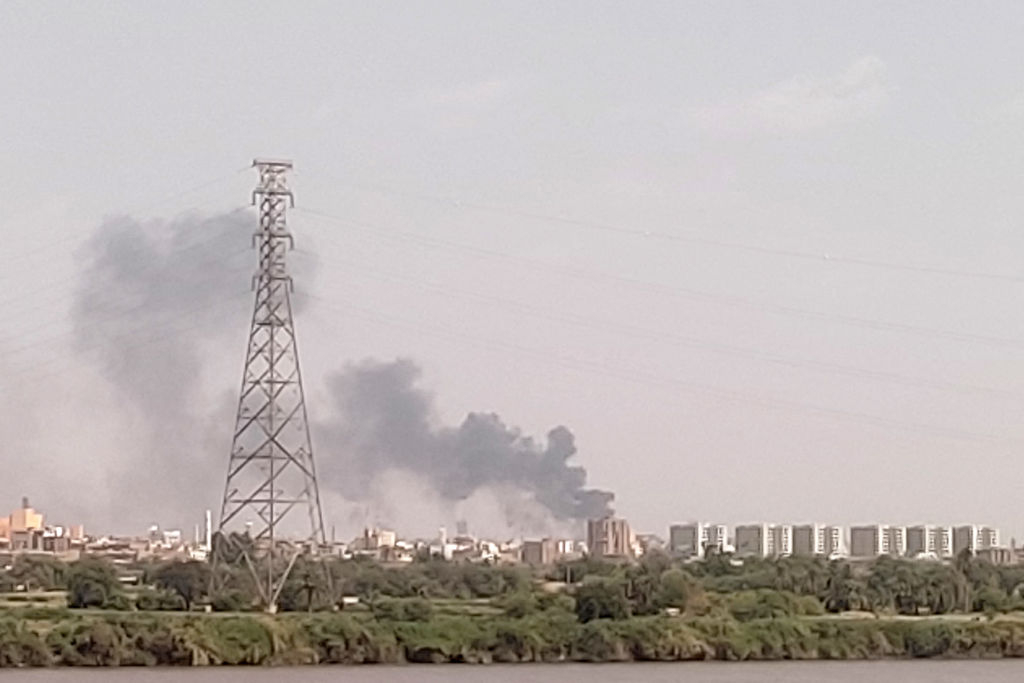Evenly Matched, Sudan Generals Reach a Stalemate While Civilians Suffer
ADF STAFF
For nearly five months, forces loyal to Sudan’s warring generals have pounded each other and countless civilians caught between them, killing many and destroying large parts of Khartoum and its sister cities in the process.
“The impact in the tripartite capital of Khartoum, Omdurman, and Khartoum North has been devastating to civilians,” Suliman Baldo, executive director of the Sudan Transparency and Policy Tracker, told ADF by email. “Most civilian casualties in the capital, and all major cities were killed by stray bullets and shells.”
Since Gen. Abdel Fattah al-Burhan and his rival general known as Hemedti launched their fight for military supremacy in Sudan, the two sides have remained evenly matched in manpower. Each general has about 100,000 troops and has maintained a foothold in Sudan’s major cities.
Al-Burhan and Hemedti have a long history of both rivalry and cooperation. Former dictator Omar al-Bashir established the Rapid Support Forces (RSF) as a hedge against the power of the Sudanese Armed Forces (SAF). Al-Burhan and Hemedti cooperated to depose al-Bashir in 2019 and again in 2021 in the coup that disrupted the planned transition to civilian rule.
Fighting broke out when al-Burhan called for folding the RSF into his SAF — a move that would have helped al-Burhan avoid a challenge to his authority by stripping Hemedti of his own power, according to observers. Hemedti opposed the plan.
Hemedti’s RSF, long trained as street fighters, have used their mobility and agility in the urban warfare around the capital region. Al-Burhan has countered by using the SAF’s capacity for aerial bombardment, drone attacks and artillery to destroy the RSF’s hiding places among the civilian population and its supply lines coming in from Darfur.
Each side has foreign allies for support and its own deep financial resources to keep the fight going. The RSF is funded through Hemedti’s decades of gold smuggling while the SAF benefits from its extensive involvement in Sudan’s economy from agriculture to oil.
Ultimately, however, neither side has the firm political base needed to rule the country unchallenged, according to Hager Ali, a researcher at the German GIGA Institute for Global and Area Studies.
United Nations Assistant Secretary-General Martha Pobee told the U.N. Security Council that neither side in the conflict is winning or making significant gains even while the civilian population suffers.
“The longer this war continues, the greater the risk of fragmentation and foreign interference and erosion of sovereignty and the loss of Sudan’s future, particularly its youth,” she said.
The fighting has destroyed crucial infrastructure in the capital region, where large areas are without electricity, water and telecommunications. The conflict also has driven an estimated 4 million Sudanese from their homes.
“What the fighting spared was later looted and burned by large bands of criminals and urban destitute who descended on residences and markets and looted whatever valuable was not already stolen by RSF soldiers,” Baldo told ADF.
Khartoum resident Nyalam Phar fled for safety in what is now South Sudan, where she was born.
“When I escaped, I did not carry with me even a single piece of clothing,” Phar told Voice of America. “My neighbor was shot along with her little daughter who was only 3 years old.”
Even as fighting devastates Sudan’s capital region, the RSF has been tightening its grip on the Darfur region. The RSF began 20 years ago as the Janjaweed, an Arab-based militia that then-dictator Omar al-Bashir created to put down rebellions by Darfur’s non-Arab population.
The RSF, which is based in East Darfur, currently controls Central Darfur and West Darfur and will likely take Nyala, the capital of South Darfur. After that, fighters will turn their attention to North Darfur, according to Baldo.
Experts says Hemedti could use his control over the Darfur region to create a state-within-a-state and continue fighting even if al-Burhan drives his forces from the capital region.
“There is going to be no winner in this war,” Baldo said.


Comments are closed.